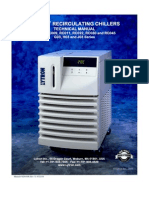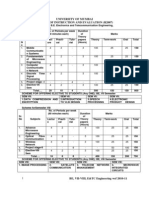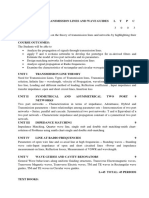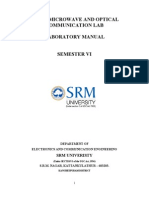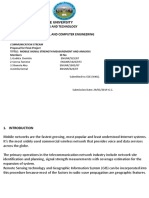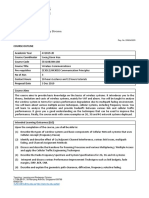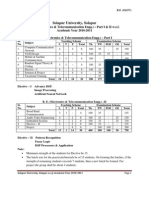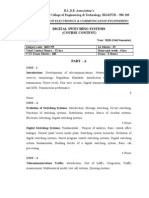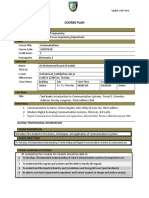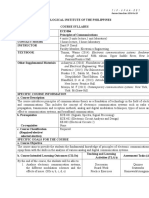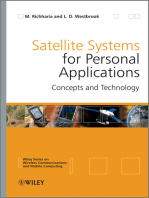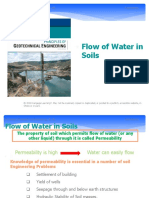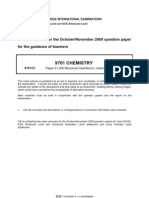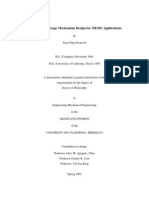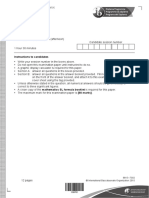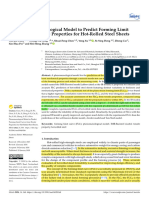Professional Documents
Culture Documents
SET4533silibusPOCO Sem2 20112012
SET4533silibusPOCO Sem2 20112012
Uploaded by
vanithasriirOriginal Description:
Original Title
Copyright
Available Formats
Share this document
Did you find this document useful?
Is this content inappropriate?
Report this DocumentCopyright:
Available Formats
SET4533silibusPOCO Sem2 20112012
SET4533silibusPOCO Sem2 20112012
Uploaded by
vanithasriirCopyright:
Available Formats
FAKULTI KEJURUTERAAN ELEKTRIK UNIVERSITI TEKNOLOGI MALAYSIA SEMESTER 2 2011/2012 SET4533: SISTEM PERHUBUNGAN WAYARLES (WIRELESS COMMUNICATION SYSTEM)
Seksyen tel. ext. 01 02 Pensyarah email Office and razalin@fke.utm.my haizal@fke.utm.my
Assoc. Prof. Dr Razali Ngah P15-120 (07-5536089) Dr Mohd Haizal Jamaluddin P15-122
Objective To introduce students to the concepts and principles of wireless communication systems. Synopsis This course introduces students the concept and principle of mobile radio communication and satellite communication system. Topics covered include mobile radio propagation, multiple access, cellular concept, modern wireless communication systems and satellite communication systems. Course outcomes (COs): At the end of the course the students should be able to: CO1- Describe the fundamentals of wireless communication system CO2- Describe the concept and operation of cellular radio system and satellite communication system CO3- Analyze the propagation for mobile and satellite communication system CO4- Work in team and communicate effectively Programme Outcomes (POs) Student of an engineering program are expected to have the following outcomes: Ability to acquire and apply knowledge of mathematics, science and engineering. Ability to analyze and interpret data/graph/circuit. Ability to identify, formulate and solve electrical engineering problems. Ability to work with modern instrumentation, software and hardware. Ability to design a system, component or process to fulfill certain specifications. Ability to communicate effectively. Ability to function and be productive in a team. Ability to recognize the need for, and to engage in life-long learning. Understand the impact of the work of engineers on society. Understand ethical and professional responsibility. Mapping of CO to PO1-P10, emphasis and assessment method CO1 CO2 CO3 C04 PO1 1,a PO2 1,a 1,a PO3 2,b 1,a PO4 3,b 2,b 2,b PO5 P06 P07 P08 P09 P10
1) 2) 3) 4)
5)
6) 7) 8) 9) 10)
1 = strong emphasis, 2 = medium emphasis, 3 = low emphasis a = examinations, tests, quizzes; b = assignment, report; c= group presentation, laboratory, seminar; d=thesis
Evaluation Quiz Test (2X- Wk 7 & Wk 12) Group Assignment Final exams Contents
10% 30% 10% 50%
Week 1: Introduction to wireless communication system Introduction. Mobile Radio Transmission Systems. Duplexing. Paging Systems. Cellular Telephone System. Channel Types. Future Trends Weeks 2-4: Mobile Radio Propagation- Large Scale Free Space Propagation Model. Basic Propagation Mechanism. Plane Earth Path Loss Model. Log-distance Path Loss Model. Outdoor Propagation Model. Okumura Model. Hata Model. Weeks 5: Mobile Radio Propagation- Small Scale Multipath propagations. Doppler Shift. Parameters of Multipath Channels. Flat Fading. Frequency Selective Fading. Fast fading. Slow Fading. Fading Distributions.
TEST 1 Weeks 6 8: Cellular Concept Conventional vs Cellular. Type of Cells. Cell Shapes. Frequency reuse. Handoff. Sectorized Cell. Interference in Cellular Radio System. Cell Splitting. Trunking and Grade of Service. Erlang B. Erlang C. Weeks 9: Multiple Access Techniques Frequency Division Multiple Access, Time Division Multiple Access. Code Division Multiple Access. Weeks 10: Modern Wireless Communication System First Generation Cellular System. GSM. UMTS (3G). Wireless Local Area Network (WLAN). Wireless Personal Area Network (WPAN), Broadband Wireless Access. TEST 2 Weeks 11 15: Satellite Communication Overview of Satellite Communication. Orbital Mechanics. Satellite Subsystems. Satellite Link Budget. Satellite Applications. References: 1. 2. 3. 4. T. S. Rappaport, Wireless Communication, Principles and Practice, Prentice Hall, 2002 W. Stallings, Wireless Communication and Networks, Prentice Hall. T. Pratt, Satellite Communications, Wiley, 2003. G. Maral, Satellite Communication Systems, Systems, Techniques and Technology, Wiley.
Course Coordinator: Prof. Tharek Abd. Rahman Prof. Dr Jafri Din
Certified by: Assoc.
Date: 16 February 2012
Date:
16 February 2012
You might also like
- EE3017 Computer Communications - OBTLDocument9 pagesEE3017 Computer Communications - OBTLAaron TanNo ratings yet
- Hess's Law and The Enthalpy of Combustion of MagnesiumDocument8 pagesHess's Law and The Enthalpy of Combustion of MagnesiumRabih DaoudNo ratings yet
- Syllabus EXTC Sem 7 Rev. (MU)Document31 pagesSyllabus EXTC Sem 7 Rev. (MU)Anurag RajNo ratings yet
- Kodiak Recirculating Chillers: Technical ManualDocument53 pagesKodiak Recirculating Chillers: Technical ManualNabeel Moin100% (3)
- Mobile Comm 1st Day HandhoutDocument3 pagesMobile Comm 1st Day HandhoutYari khanNo ratings yet
- Week 1 - General Overview of The Course, Mobile Technologies and ServiceDocument30 pagesWeek 1 - General Overview of The Course, Mobile Technologies and Serviceadekeyeolaoluwa9No ratings yet
- CSE 444 Mobile Communications Course OutlineDocument4 pagesCSE 444 Mobile Communications Course OutlineTooba Arshad0% (1)
- Cit 655Document180 pagesCit 655Jenni Jenni JNo ratings yet
- Syllabus 7 TH Sem RVCE TELECOMDocument79 pagesSyllabus 7 TH Sem RVCE TELECOMsam ahujNo ratings yet
- ELE815 Course OutlineDocument7 pagesELE815 Course Outlinethisismypc296No ratings yet
- Birla Institute of Technology & Science, Pilani Course Handout Part A: Content DesignDocument7 pagesBirla Institute of Technology & Science, Pilani Course Handout Part A: Content Designwicked_not_meNo ratings yet
- Mobile Communication Systems: University of Mumbai Scheme of Instruction and Evaluation (R2007)Document27 pagesMobile Communication Systems: University of Mumbai Scheme of Instruction and Evaluation (R2007)Vignesh AigalNo ratings yet
- ECE09 SyllabusDocument5 pagesECE09 SyllabusCyrill Kino Escolano FscNo ratings yet
- SS ZG520 HandoutDocument7 pagesSS ZG520 Handoutmusarraf172No ratings yet
- Cio Ep501 Dis 2015Document3 pagesCio Ep501 Dis 2015api-118472949No ratings yet
- Course File: Name of The Faculty: Mr. MOUSAM CHATTERJEEDocument25 pagesCourse File: Name of The Faculty: Mr. MOUSAM CHATTERJEESamraj JebasinghNo ratings yet
- Transmission Media and Antenna SystemsDocument3 pagesTransmission Media and Antenna SystemsCedric Dela Cruz50% (2)
- Basic Electronics & Communication EngineeringDocument40 pagesBasic Electronics & Communication EngineeringChandra Shekar MedarNo ratings yet
- ExtcDocument48 pagesExtcSagar KuchekarNo ratings yet
- TLWDocument12 pagesTLWeswaranNo ratings yet
- Ee 115 - EtapDocument6 pagesEe 115 - EtapMichael Calizo PacisNo ratings yet
- Subject Orientation On: Padmabhushan Vasantdada Patil Pratishthan's College of EngineeringDocument23 pagesSubject Orientation On: Padmabhushan Vasantdada Patil Pratishthan's College of EngineeringPramod PuttaNo ratings yet
- ELE 361 SyllabusDocument3 pagesELE 361 SyllabusbabycryyNo ratings yet
- Microwave & Optical Communication Lab Manual - SRMDocument102 pagesMicrowave & Optical Communication Lab Manual - SRMwizardvenkat100% (6)
- ECE14 SyllabusDocument4 pagesECE14 SyllabusinhinyerokinoNo ratings yet
- B.tech (ECE) 7th & 8th Sem.Document17 pagesB.tech (ECE) 7th & 8th Sem.Anuj RajNo ratings yet
- 21ELN14 - Module - 4 - Analog and Digital CommunicationDocument47 pages21ELN14 - Module - 4 - Analog and Digital CommunicationChandra Shekar Medar100% (1)
- ENEE3309 OutlineDocument5 pagesENEE3309 OutlineJLM SSNo ratings yet
- Principles of Elecgtronic CommunicationsDocument20 pagesPrinciples of Elecgtronic CommunicationsPreethiNo ratings yet
- Modern Communication TechnologiesDocument3 pagesModern Communication TechnologiesSourabh VoraNo ratings yet
- Ece 5870Document6 pagesEce 5870Kavuri Sai PradeepNo ratings yet
- Wolkite University College of Engineering and Technology Department of Electrical and Computer EngineeringDocument12 pagesWolkite University College of Engineering and Technology Department of Electrical and Computer EngineeringsoresaNo ratings yet
- EE4188 Wireless Communications - OBTLDocument7 pagesEE4188 Wireless Communications - OBTLAaron TanNo ratings yet
- DCIT426 - Course SyllabusDocument4 pagesDCIT426 - Course Syllabusralph viruskyNo ratings yet
- Solapur University, SolapurDocument34 pagesSolapur University, SolapurVenkatesh SardaNo ratings yet
- Lovely Professional University, Punjab: Detailed Plan For LecturesDocument8 pagesLovely Professional University, Punjab: Detailed Plan For LecturesAmit AntilNo ratings yet
- EE 497G SyllabusDocument2 pagesEE 497G SyllabusElly DragicNo ratings yet
- Mobile Communication SlideDocument251 pagesMobile Communication SlideVõ Thanh LiêmNo ratings yet
- Eee 423 Mobile Communication Course PorfolioDocument27 pagesEee 423 Mobile Communication Course PorfolioSalome ChivimaNo ratings yet
- Preface: Dr. B. K. SridharaDocument49 pagesPreface: Dr. B. K. SridharaJeevith JeeviNo ratings yet
- Syllabus 471c Wireless Communications LaboratoryDocument6 pagesSyllabus 471c Wireless Communications Laboratorycount3r5tr1keNo ratings yet
- Ueeca41 - Wireless Communication Network 1.PRE-REQUISITE: Communication Systems and TechniquesDocument8 pagesUeeca41 - Wireless Communication Network 1.PRE-REQUISITE: Communication Systems and TechniquessarvanmeNo ratings yet
- 10BNEC732 Mobile CommunicationsDocument2 pages10BNEC732 Mobile CommunicationsAyush PurohitNo ratings yet
- Satellite Communication: Course FileDocument109 pagesSatellite Communication: Course FileSaiteja GundapuNo ratings yet
- Digital Switching Systems (Course Content)Document31 pagesDigital Switching Systems (Course Content)ravimhattiNo ratings yet
- On Types of Antenna ArrayDocument18 pagesOn Types of Antenna ArrayRitambharaNo ratings yet
- Ee 117L - ObeDocument5 pagesEe 117L - ObeMichael Calizo PacisNo ratings yet
- CIT755Document224 pagesCIT755Onanuga Piousmusic TobiNo ratings yet
- Course Outline Digital Communication SystemsDocument6 pagesCourse Outline Digital Communication SystemsHaleema UshaqNo ratings yet
- ECE 3001/navi 3001/ECE3201 Electronic Projects: Fall Semester 2016Document3 pagesECE 3001/navi 3001/ECE3201 Electronic Projects: Fall Semester 2016jagriti kumariNo ratings yet
- Course Syllabus Ofcomm I Sem Oct.2020Document3 pagesCourse Syllabus Ofcomm I Sem Oct.2020raven wolfNo ratings yet
- Firstday HandoutDocument4 pagesFirstday HandoutMasood ChoudharyNo ratings yet
- ECE004 Syllabus Rev1-1Document3 pagesECE004 Syllabus Rev1-1Dennis ANo ratings yet
- Edc Lab Observation Gpcet (2016-17)Document67 pagesEdc Lab Observation Gpcet (2016-17)prasannakumar_7No ratings yet
- Syllabus - Microwave EngineeringDocument4 pagesSyllabus - Microwave Engineeringta phong voNo ratings yet
- Syllabus ECE 6331Document3 pagesSyllabus ECE 6331Jesus BrownNo ratings yet
- LTE-Advanced and Next Generation Wireless Networks: Channel Modelling and PropagationFrom EverandLTE-Advanced and Next Generation Wireless Networks: Channel Modelling and PropagationNo ratings yet
- Full-Duplex Communications for Future Wireless NetworksFrom EverandFull-Duplex Communications for Future Wireless NetworksHirley AlvesNo ratings yet
- Next Generation Wireless Communications Using Radio over FiberFrom EverandNext Generation Wireless Communications Using Radio over FiberNo ratings yet
- Satellite Systems for Personal Applications: Concepts and TechnologyFrom EverandSatellite Systems for Personal Applications: Concepts and TechnologyNo ratings yet
- TOSCA Structure 81 Short SeminarDocument37 pagesTOSCA Structure 81 Short SeminarmhsafeNo ratings yet
- Unit 4 Flow of Water in SoilDocument31 pagesUnit 4 Flow of Water in SoilKhalil FanousNo ratings yet
- Whole House Humidifier: Model: TM-2000Document20 pagesWhole House Humidifier: Model: TM-2000IBJSC.comNo ratings yet
- 9701 w09 Ms 21Document7 pages9701 w09 Ms 21Hubbak KhanNo ratings yet
- Groundwater Lab ReportDocument8 pagesGroundwater Lab ReportDaniel PayerasNo ratings yet
- Compliant Leverage Mechanism Design For MEMs ApplicationDocument246 pagesCompliant Leverage Mechanism Design For MEMs ApplicationKeyvan Rahmani MonfaredNo ratings yet
- Review of Pedestrian Load Models For Vibration Serviceability Assessment of Floor StructuresDocument24 pagesReview of Pedestrian Load Models For Vibration Serviceability Assessment of Floor StructuresBelen Mustafa - SucreNo ratings yet
- X-Ray Tube in CT Scanner PDFDocument17 pagesX-Ray Tube in CT Scanner PDFAlexandra Nicoleta TeisiNo ratings yet
- Mathematics Standard Level Paper 2: Instructions To CandidatesDocument12 pagesMathematics Standard Level Paper 2: Instructions To CandidatesTala ZeerNo ratings yet
- Semi Automatic Bending Machine: Project OnDocument10 pagesSemi Automatic Bending Machine: Project OnMarina CdfmNo ratings yet
- Lightning Protection: 2.0. Design BasisDocument4 pagesLightning Protection: 2.0. Design BasisVivek CNo ratings yet
- 1 Free Vibration Damping For ClassDocument22 pages1 Free Vibration Damping For ClassAshok JohnNo ratings yet
- TL43xx Precision Programmable Reference: 1 Features 3 DescriptionDocument82 pagesTL43xx Precision Programmable Reference: 1 Features 3 Descriptiondiego dNo ratings yet
- Chapter 8 More About EquationsDocument14 pagesChapter 8 More About Equationsapi-3704862No ratings yet
- Analogue Instruments REV 04-10Document86 pagesAnalogue Instruments REV 04-10engazshamsNo ratings yet
- SPWLA Paper AshokKUmarDocument12 pagesSPWLA Paper AshokKUmarKilaparthi SatyavammaNo ratings yet
- DU BushesDocument56 pagesDU BushesBlashko GjorgjievNo ratings yet
- Optical Communications (OC)Document22 pagesOptical Communications (OC)Bharat ChilamkuriNo ratings yet
- Introduction To and Presentation of DMADocument81 pagesIntroduction To and Presentation of DMAtayitooo100% (1)
- The Art of Wildland Firefighting - The Campbell Prediction SystemDocument24 pagesThe Art of Wildland Firefighting - The Campbell Prediction SystemANASTASIOS TOPALIDES100% (1)
- Natural Head Position / Orthodontic Courses by Indian Dental AcademyDocument132 pagesNatural Head Position / Orthodontic Courses by Indian Dental Academyindian dental academyNo ratings yet
- Bangalore Sahodaya Schools Complex Association (Bssca)Document2 pagesBangalore Sahodaya Schools Complex Association (Bssca)Sundara MoorthyNo ratings yet
- Lead Free ReworkDocument8 pagesLead Free ReworkA2SElectroniqueNo ratings yet
- A New Phenomenological Model To Predict Forming LiDocument18 pagesA New Phenomenological Model To Predict Forming LiAyushman kumarNo ratings yet
- Analysis of Singly Reinforced Concrete Beam PDFDocument3 pagesAnalysis of Singly Reinforced Concrete Beam PDFAnton_Young_1962No ratings yet
- ReadingDocument4 pagesReadingEvi Fatimah SusantoNo ratings yet
- Universiti Teknologi Mara: Kampus Pulau PinangDocument5 pagesUniversiti Teknologi Mara: Kampus Pulau PinangBright KnightNo ratings yet
- VCE Math Quest - Specialist Maths - Year 11Document96 pagesVCE Math Quest - Specialist Maths - Year 11Anila Jayaraj100% (1)



